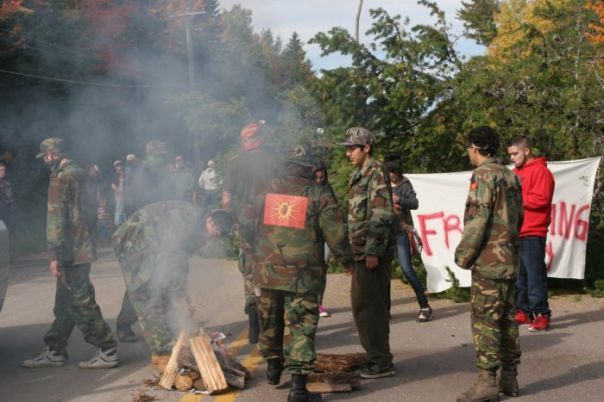You are here
fracking
The Fine Print I:
Disclaimer: The views expressed on this site are not the official position of the IWW (or even the IWW’s EUC) unless otherwise indicated and do not necessarily represent the views of anyone but the author’s, nor should it be assumed that any of these authors automatically support the IWW or endorse any of its positions.
Further: the inclusion of a link on our site (other than the link to the main IWW site) does not imply endorsement by or an alliance with the IWW. These sites have been chosen by our members due to their perceived relevance to the IWW EUC and are included here for informational purposes only. If you have any suggestions or comments on any of the links included (or not included) above, please contact us.
The Fine Print II:
Fair Use Notice: The material on this site is provided for educational and informational purposes. It may contain copyrighted material the use of which has not always been specifically authorized by the copyright owner. It is being made available in an effort to advance the understanding of scientific, environmental, economic, social justice and human rights issues etc.
It is believed that this constitutes a 'fair use' of any such copyrighted material as provided for in section 107 of the US Copyright Law. In accordance with Title 17 U.S.C. Section 107, the material on this site is distributed without profit to those who have an interest in using the included information for research and educational purposes. If you wish to use copyrighted material from this site for purposes of your own that go beyond 'fair use', you must obtain permission from the copyright owner. The information on this site does not constitute legal or technical advice.





 With the federal government’s approval of the Enbridge Northern Gateway pipeline on June 17, 2014, there arose a chorus of angry disapproval from many people in BC. Some talked about waging a “war against Enbridge,” while others proclaimed the beginning of the “battle.” Predictably, the political parties opposed to the Conservative government promised to put a stop to Enbridge, if elected. Those who have worked to oppose Enbridge over the past 5 years renewed their pledges to carry out court cases, referendums, voting campaigns, as well as civil disobedience.
With the federal government’s approval of the Enbridge Northern Gateway pipeline on June 17, 2014, there arose a chorus of angry disapproval from many people in BC. Some talked about waging a “war against Enbridge,” while others proclaimed the beginning of the “battle.” Predictably, the political parties opposed to the Conservative government promised to put a stop to Enbridge, if elected. Those who have worked to oppose Enbridge over the past 5 years renewed their pledges to carry out court cases, referendums, voting campaigns, as well as civil disobedience.
 UPDATE 3:32pm PDT: Abby has been extracted after an epic 8 hour blockade.
UPDATE 3:32pm PDT: Abby has been extracted after an epic 8 hour blockade.  Is there a salary worth risking your health or even your life? Big Oil and Gas might think so, but the ex-industry workers with whom we spoke aren’t so convinced.
Is there a salary worth risking your health or even your life? Big Oil and Gas might think so, but the ex-industry workers with whom we spoke aren’t so convinced. The term “fracking” has come to mean far more than just the specific process of hydraulic fracturing, when companies inject large volumes of fracking fluid composed of water, sand and chemicals deep underground, at extreme pressure, to create fractures in targeted rock formations to bring oil and gas to the surface.
The term “fracking” has come to mean far more than just the specific process of hydraulic fracturing, when companies inject large volumes of fracking fluid composed of water, sand and chemicals deep underground, at extreme pressure, to create fractures in targeted rock formations to bring oil and gas to the surface. Tar sands pipelines face increasing resistance both in the United States and Canada. As existing pipelines reach capacity, the delay and possible cancellation of new pipelines is costing tar sands producers billions of dollars and reducing investment in the sector. The success of anti-pipeline campaigns has forced industry to look to rail in an attempt to address these losses and open new markets for their product.
Tar sands pipelines face increasing resistance both in the United States and Canada. As existing pipelines reach capacity, the delay and possible cancellation of new pipelines is costing tar sands producers billions of dollars and reducing investment in the sector. The success of anti-pipeline campaigns has forced industry to look to rail in an attempt to address these losses and open new markets for their product.
 MOSCOW, August 21 (RIA Novosti) - British anti-fracking protesters are getting creative in their fight against a network of lobbying groups supported by the United Kingdom’s shale gas extraction industry.
MOSCOW, August 21 (RIA Novosti) - British anti-fracking protesters are getting creative in their fight against a network of lobbying groups supported by the United Kingdom’s shale gas extraction industry. Whereas, 350 Seattle supports the use of railroads to transport mixed freight and passengers as the most environmental and less carbon intensive way of doing this; and
Whereas, 350 Seattle supports the use of railroads to transport mixed freight and passengers as the most environmental and less carbon intensive way of doing this; and